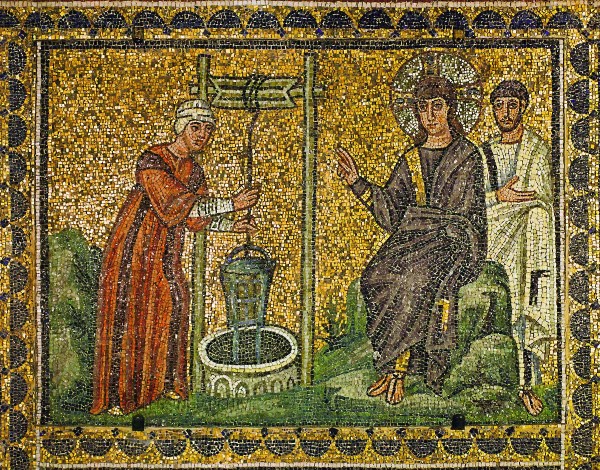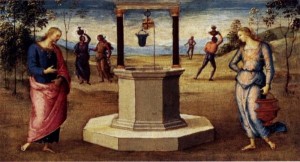“A Spring of Water Welling up to Eternal Life”
The expansion of Christianity, the salvation of mankind, has been carried out, from the time of Christ and St. Photini until now, by the one-on-one contact of individual Christians with non-Christian populations. The lay people, as well as clergy and monastics, young and old, by their daily contacts with those outside the Church are in a position to bear witness to the present reality of the Gospel of salvation. They are the ones who themselves, transformed by the Gospel, have done all manner of good works and contributed positively to the stability and moral fiber of society. The expansion of the Church has most often been a grassroots movement of spreading the faith from person to person by means of practical works and verbal witness.
St. Photini, following Jesus’ example, brings together the two aspects of being a living witness—proclamation and good works—the illuminating light and preserving salt of which Christ speaks (Matthew 5:12–16). The light of their life, their proclamation and good works, shines into the darkness of a broken world and causes others to glorify God. Saint Paul confirms this by teaching all believers that their lives should be characterized by moral excellence and good works, and that their speech should be a proclamation of the truth marked by “grace and seasoned with salt”—as a witness to those seeking the truth (Colossians 4:5–6).
Saint Peter speaks of the same two themes, insisting that a Christian’s conduct be such that the non-Christians see the good works done by the believers and glorify God because of it (1 Peter 2:11–22). He also instructs Christians to be ready at all times to bear witness of their hope in Christ (1 Peter 3:15). Do our lives draw others to salvation? Or perhaps push them away from God?
To merely see a true Christian causes men and women to turn from an undisciplined, self-absorbed, and immoral life. Indeed, it is the moral excellence of lives changed by Christ that acts as the primary attractive power in the world. Historically, this attractive power was the most important aspect of the early Christian witness, and the fact that Christians were the most upstanding citizens was one of the prime arguments of the earliest apologists. For example, Aristides, a Christian of Athens writing to the Emperor Hadrian (reigned 117–138) around the year 125, based his defense of Christianity against persecution on the obviously different quality of their character. He points out that these Christians “do not commit adultery nor fornication, nor bear false witness, nor embezzle what is held in pledge, nor covet what is not theirs. They honor father and mother and show kindness to those near to them; and when ever they are judges, they judge uprightly” (Apology 15). He goes on to tell how Christians took care of strangers and supplied the needs of the poor and the imprisoned. The indisputable witness of the Christian life was that of discerning and responding to the moral and physical needs of the world around them.
In the example of St. Photini, we see in action once again the commandment of Christ to love God, and love neighbor. To love God is to live a life that is pleasing to Him and an ascent towards holiness. To love neighbor is to manifest life in Christ by action, deed, and word. As the Samaritan woman pondered the excellence of Jesus’ words and freely exchanged, forever, her life of sin for a life in Christ, may we also abandon our worldly attachments, already being Christians, and cherish the opportunity we have to cut off the sins of our fore fathers and freely pursue Christ.
Pause sometime before the icon of the Samaritan woman in the narthex. Don’t just pass by, but look at her there with Jesus at the well. Think about what she was—and what she became—St. Photini. Her encounter with Christ became the crossroads to an incredible adventure and the salvation of thousands of people. Christ fully revealed Himself to her as the promised Messiah, and she followed Him. Pray to St. Photini and ask her to pray for us—that we also may follow her into Paradise.
Christ is risen!




















